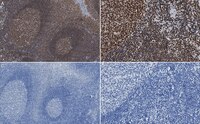MABF2793-100UL Sigma-AldrichAnti-Smith Antigen Antibody, clone Y12
Anti-Smith Antigen, clone Y12, Cat. No. MABF2793, a mouse monoclonal antibody detects Smith antigen and is tested in ELISA, Immunohistochemistry, Immunofluorescence, Immunoprecipitation, RIA, RNA Binding Protein IP (RIP), and Western Blotting.
More>> Anti-Smith Antigen, clone Y12, Cat. No. MABF2793, a mouse monoclonal antibody detects Smith antigen and is tested in ELISA, Immunohistochemistry, Immunofluorescence, Immunoprecipitation, RIA, RNA Binding Protein IP (RIP), and Western Blotting. Less<<Recommended Products
Overview
| Replacement Information |
|---|
| References |
|---|
| Product Information | |
|---|---|
| Format | Purified |
| Presentation | Purified mouse monoclonal antibody IgG3 in buffer containing 0.1 M Tris-Glycine (pH 7.4), 150 mM NaCl with 0.05% sodium azide. |
| Quality Level | MQ200 |
| Physicochemical Information |
|---|
| Dimensions |
|---|
| Materials Information |
|---|
| Toxicological Information |
|---|
| Safety Information according to GHS |
|---|
| Safety Information |
|---|
| Storage and Shipping Information | |
|---|---|
| Storage Conditions | Recommend storage at +2°C to +8°C. For long term storage antibodies can be kept at -20°C. Avoid repeated freeze-thaws. |
| Packaging Information | |
|---|---|
| Material Size | 100 µL |
| Transport Information |
|---|
| Supplemental Information |
|---|
| Specifications |
|---|
| Global Trade Item Number | |
|---|---|
| Catalogue Number | GTIN |
| MABF2793-100UL | 04065267216683 |
Documentation
Anti-Smith Antigen Antibody, clone Y12 SDS
| Title |
|---|
Anti-Smith Antigen Antibody, clone Y12 Certificates of Analysis
| Title | Lot Number |
|---|---|
| Anti-Smith Antigen, clone Y12 - 4018540 | 4018540 |
| Anti-Smith Antigen, clone Y12 - 4107746 | 4107746 |
| Anti-Smith Antigen, clone Y12 - Q3764754 | Q3764754 |








